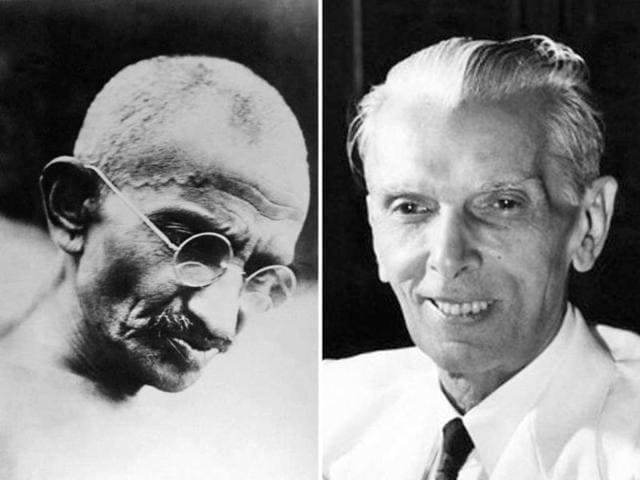Did Gandhi and Jinnah almost establish a legal partnership?
Could Mahatama Gandhi and Mohammed Ali Jinnah have established a legal partnership in South Africa, 50 years before Indian and Pakistan were formed? Yes, it could have been possible, according to noted historian and author Ramachandra Guha.
Could Mahatama Gandhi and Mohammed Ali Jinnah have established a legal partnership in South Africa, 50 years before Indian and Pakistan were formed? Yes, it could have been possible, according to noted historian and author Ramachandra Guha who made the deduction on the basis of available literature and archival records.

"A logbook at Sabarmati Ashram in Ahmedabad maintains the record of letters sent to Gandhi between the years 1895-97. In this logbook, there are two letters from a certain MA Jinnah, and they are dated 21 January and 23 March, 1897," Guha said.
The historian launched Gandhi Before India, the first book of his two-volume biography of Mahatma Gandhi, published by Penguin India here late last evening.
While the contents of the letter are not available, Guha says he pieced together "this curious information," based on existing documents in the public domain.
Jinnah's return from London in 1897, his visit to hometown Karachi and his struggles in Bombay to establish himself as a lawyer are facts well established.
Also documented are Gandhi's correspondences with the lawyer Kalihar Khan, based in India from where Bapu wanted to get an Indian lawyer to assist him, as well as his letters with a Durban merchant Parsee Rustomjee in South Africa.
"Jinnah was a briefless lawyer in Bombay in 1897. Gandhi had been a briefless lawyer five years ago in the same city. Gandhi was looking for a partner and Jinnah was out of work. Jinnah was Gujarati, so was Gandhi. Gujaratis in South Africa were both Hindus and Muslims," Guha said.
"Could it be that 50 years before India and Pakistan were formed, Gandhi and Jinnah almost established a legal partnership in South Africa?" Guha wondered.
The just launched book, claims Guha, is "the first thorough account of crucial formative years in the life of the Mahatma".
Covering the period from October 1869, the year of the Mahatma's birth till his return to India from South Africa in July 1914, the tome details his upbringing in 19th century Gujarat. Vivid details of Gandhi's student years in London right up till the two decades, he spent in South Africa have been written at length.
Guha said this crucial phase of Gandhi's life, which was instrumental in shaping the Mahatma from a run-of-the mill lawyer has very often got short shrift in existing literature.
"One of Gandhi's most original, compelling and still relevant ideas is the idea of religious pluralism. The emphasis on religious pluralism is certainly important to India today but not just to India," Guha said.
"Gandhi's biographers have tended to skip hastily over this phase of his life, treating it as a prelude to his later, apparently more important, work in India. They have chosen to consider his life in teleological terms, with his work in South Africa preparing the way for his more important work in his homeland," said Guha.
Much of the blame for what he calls "one-sided approach to Gandhi", lies with the sole reliance on the "Collected Works of Mahatma Gandhi," a collection of nearly all his writings running into 100 volumes.
"They (scholars) have represented, recreated, analysed, dissected the works, legacy and thought of Gandhi largely, if not exclusively from the perspective of Gandhi himself," he said.
"As a historian, I felt that there must be other ways of writing about Gandhi," said the historian.
Guha's says his present work arises out of a quest for an alternative Gandhi, who speaks not only through his own writings, but also through the works of his associates and critics.
"To properly understand Gandhi, one has to look at him from all angles not just his own, from that of his friends and followers and from that of his enemies and adversaries," Guha said.
This quest for writing "a many-sided portrait" of Gandhi took the historian to many obscure and not so obscure archives in Delhi, Bombay, Kolkata, Chennai, London, Oxford, Pretoria in South Africa and Haifa in Israel.
The author acknowledged the importance of South Africa in the making of Mohandas K Gandhi and hence, strove towards tracing the journey of the 'Afrikaner Gandhi' in the new book
"That's where (South Africa), he became a true Indian; that's where he became more sensitive to gender rights; that's where he became an early environmentalist; that's where he became a theorist and practitioner of 'Satyagraha' and that's where he acquired his rare moral courage," Guha said.
The historian said he has encountered "the extraordinary, remarkable and alive figure" Gandhi, all through his professional life spanning nearly three decades as a historian and writer, where he has experimented with genres like environmental history, biography and social history.
An avid cricket buff, references to Gandhi have been constant in Guha's writings even in cricket, a sport Gandhi is never known to have watched or played.



